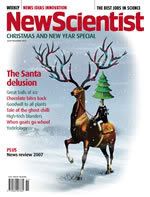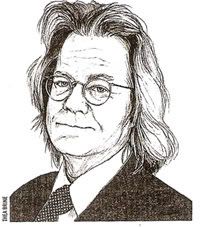
The Christmas 2007 issue was a case in point, the jackboots making their first contact in the letters page. One, from John Falla, talks about "prying the dying hands of the Anglican Church", which, along with its shot at state funding of faith schools, is an edited version of his blog-post made just over a month previously. If the whole blogged comment about faith schools funded by the state was sent to the New Scientist, they perhaps had an uncharacteristic attack of scruples and adjudged it too strong, but anybody, like me, who had read The God Delusion knew where the litany was heading.
Another letter, summarised in the first link in the above paragraph, is deliciously spiteful and deserves quoting in its entirety:
"What good is religion? I'll tell you. It's by far the greatest labour-saving device ever invented. Why? Because once you believe, you never have to think again. The amount of painful effort this must have saved throughout history is enormous!"
Substitute "ideology" for "religion", and you might almost be approaching the truth.

AC Grayling wrote a commentary which meshed with the title of another letter, "Every Cell is Sacred" - itself a play on Every Sperm is Sacred from Monty Python's tired The Meaning of Life. In it, he castigates pro-lifers for their "unethical" views, because "of the billions of eggs laid by fish, only about 0.5 per cent hatch...hundreds of spermatozoa die before reaching an ovum, and billions of ova are expended unfertilised in monthly cycles." He takes absolutely no account of the opposite viewpoint, that adult stem cells are more valuable than embryonic ones in the fight against degenerative diseases; nor of the viewpoint that, according to his lights, he commits mass murder every time he spends time with the love of his life.
Anyway, letters of complaint were sent, which received stock answers that New Scientist would "consider" publishing letters objecting to these viewpoints; references to the Press Complaints Commission were pooh-poohed.
Perhaps the letters reminded the editors of their responsibility to protect the magazine's reputation when possible, however, because come Easter there was only one reference to matters religious - tucked away on the front cover, the phrase "Bribery and Salvation", which referred to an article called Save the climate by saving the forests. Of course! What else could salvation refer to?
For an initial answer, I turned (as a practicing etymologist) to Chambers' Dictionary, which defines "salvation" as "the act of saving; the means of preservation from any serious evil; the saving of man [sic] from the power and the penalty of sin, the conferring of eternal happiness". The online version, kept up-to-date through its etymological monitoring service WordTrack, defines salvation as "the liberation or saving of man [sic] from the influence of sin, and its consequences for his soul." Obviously the orthodoxy of New Scientist, which plans to save us from something or other with atheism, eco-friendly light-bulbs and trees, hasn't filtered through to the wordsmiths.
On Ash Wednesday morning I went into Cantabrigia for Mass. It was packed - as were the other two, so I hear, making a total of more people than tend to show up for Sunday Mass. Coming to church at emotive times of the year such as the start of Lent, Easter and Christmas, seem to be related to rituals by which we try to connect with a past that is gone and sometimes never even existed, like making it home for Christmas or toasting absent friends.
That evening, I attended the Imposition of Ashes at the local Anglican church in the draughty old fen. Revd Cantiana, the lady vicar who ashed me, gave the time-honoured warning, "remember you are ashes, and to ashes you will return".
Beforehand, I was speaking with one of the ordinands - trainee vicars - about unity between our Churches. Sometimes it's like being in one of two branches of a family whose forefathers have had a feud which is continued by the descendants even though they aren't quite sure what the feud was about, and the grandparents can't shed any light on the matter because they're dead.
During Lent I took Holy communion round Addenbrookes a couple of times. Sometimes the faith of people who are being put through the mill leaves me not entirely pleased with myself. Will I have to wait until I attain that degree of realisation of the proximity of death before what really matters becomes real to me?
And so we come through Easter, when everything changed, to Pentecost, the birthday of the Church. If nature is parsimonious, as radical militant atheists proclaim, it seems to me that the ideas of salvation and redemption, and generally of turning things upside down, must be encoded within us or else they would have been selected out.

As one of the correspondents to New Scientist's Christmas issue realised, "any scientist knows that the moment all mysteries are conquered is the moment their grant money dries up". Christians don't generally get grants, but we realise all the same that there are mysteries in this life that are not explicable by Large Hadron Colliders at an eqivalent cost to several million human beings' lives; we trust that God acts through us in mysterious ways that we may never understand this side of the pearly gates.
In short, we trust in God.











No comments:
Post a Comment
Please feel free to leave a comment - Frugal Dougal.